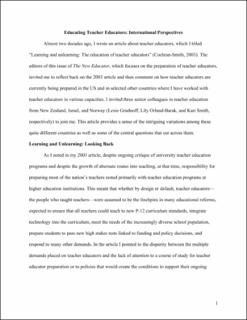Educating Teacher Educators: International Perspectives
Peer reviewed, Journal article
Accepted version
Permanent lenke
https://hdl.handle.net/11250/2648676Utgivelsesdato
2019Metadata
Vis full innførselSamlinger
- Institutt for lærerutdanning [3564]
- Publikasjoner fra CRIStin - NTNU [38014]
Sammendrag
The people who prepare teachers – teacher educators – are often explicitly or implicitly held accountable for teacher quality and are frequently blamed when school students do not meet national or international expectations. Despite high expectations, historically there has been little attention to the education of teacher educators or to local and larger policies that would support the development of teacher educators who are prepared to meet the complex demands of teaching teachers for the twenty-first century. This includes addressing the persistent discrepancies and “gaps” between historically privileged and disadvantaged groups in terms of educational opportunities and outcomes. In this article, Cochran-Smith and colleagues analyze how teacher educators are educated in four different countries – the U.S., New Zealand, Israel, and Norway – which vary considerably in terms of their historical, geopolitical, and policy contexts. The article suggests that international perspectives on the policies and practices related to the education of teachers and teacher educators are important politically, sociologically and educationally. They reveal commonalities and differences in how those in power desire to shape the education of those who will shape the lives of society’s future participants and reveal a great deal about nations’ priorities, assumptions, and values related to equity and inequity.
